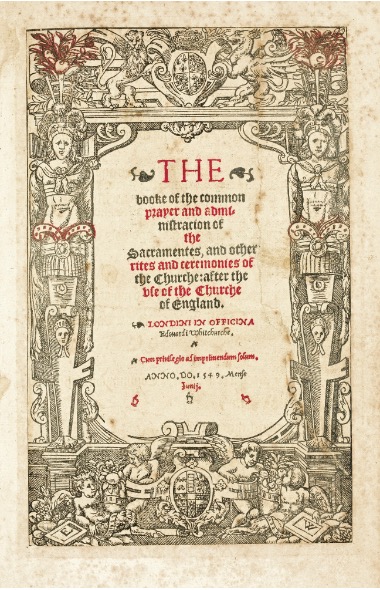Bulletin Insert: The First Book of Common Prayer – May 26, 2024
This bulletin insert was very lightly adapted from Holy Women, Holy Men’s entry for the First Book of Common Prayer. This feast of the church can be observed on a weekday after Pentecost.

The first Book of Common Prayer, the forerunner of those well-worn books in your pew rack, came into use on the Day of Pentecost, June 9, 1549, in the second year of the reign of King Edward VI. From it have descended all subsequent editions and revisions of the book in the churches of the Anglican Communion.
Though prepared by a commission of learned bishops and priests, the format, substance, and style of the Prayer Book were primarily the work of Thomas Cranmer, Archbishop of Canterbury, 1533–1556. The principal sources employed in its compilation were the medieval Latin service books of the Use of Sarum (Salisbury), with enrichments from the Greek liturgies, certain ancient Gallican rites, the vernacular German forms prepared by Luther, and a revised Latin liturgy of the reforming Archbishop Hermann of Cologne. The Psalter and other biblical passages were drawn from the English “Great Bible” authorized by King Henry VIII in 1539, and the Litany was taken from the English form issued as early as 1544.
The originality of the Book of Common Prayer, apart from the felicitous translations and paraphrases of the old Latin forms, lay in its simplification of the complicated liturgical usages of the medieval Church, so that it was suitable for use by the laity as well as by the clergy. The book thus became both a manual of common worship for Anglicans and a primary resource for their personal spirituality.
A Collect to Mark the First Book of Common Prayer
Almighty and everliving God, whose servant Thomas Cranmer, with others, did restore the language of the people in the prayers of thy Church: Make us always thankful for this heritage; and help us so to pray in the Spirit and with the understanding, that we may worthily magnify thy holy Name; through Jesus Christ our Lord, who liveth and reigneth with thee and the Holy Spirit, one God, for ever and ever. Amen.
Don’t forget to subscribe to the Sermons That Work podcast to hear this sermon and more on your favorite podcasting app! Recordings are released the Thursday before each liturgical date.
Receive Free Weekly Sermons That Work Resources!


